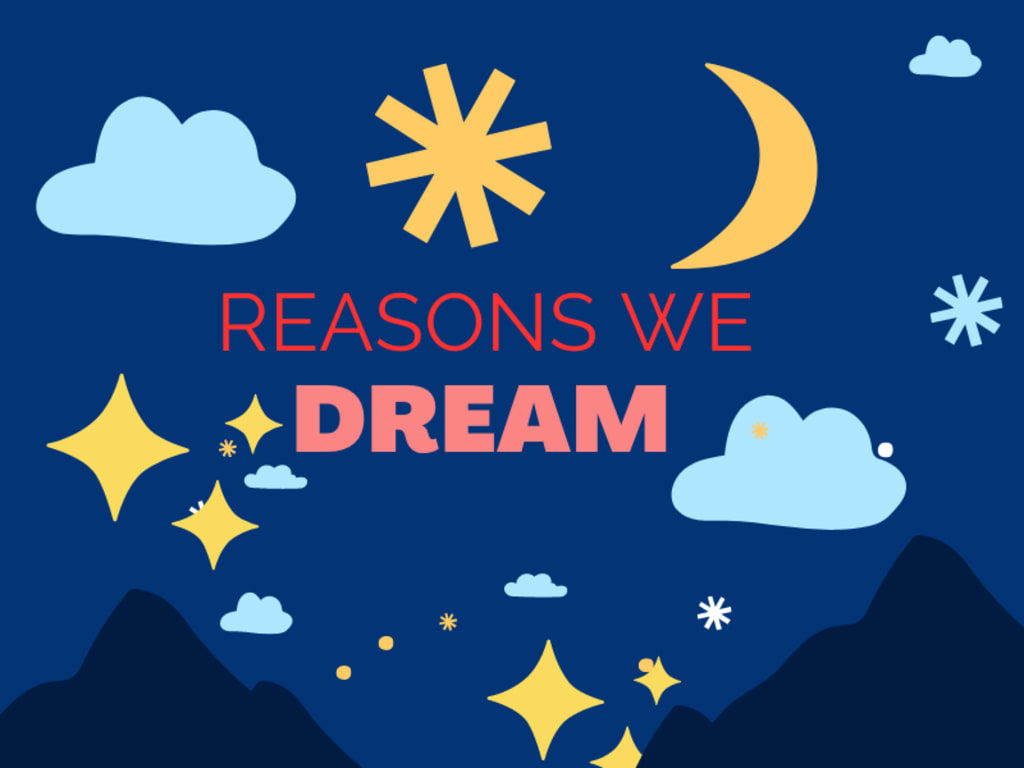
REASONS WE DREAM
A dream diary was written by the ancient Egyptians a thousand years later. Listing the meanings of more than a hundred typical dreams. We haven't stopped trying to figure out why we dream over the years. So, despite extensive scientific study, technological development, and perseverance, we still lack conclusive solutions, though we do have some intriguing theories. We fantasize in order to get what we want.
Sigmund Freud claimed in the early 1900s that all of our dreams, even our nightmares, are composed of imagery from our awakened daily life, but they also have symbolic meanings that are connected to the accomplishment of our subconscious desires. According to Freud's theory, everything we recall after waking up from a dream is a symbolic picture of our subconscious drives, urges, and desires.
Freud felt that by examining such recollected details, the unconscious material would be made conscious to our conscious mind, allowing us to confront and treat psychological problems resulting from its suppression. To remember, we fantasize.
Dreaming is beneficial for improving performance on specific mental tasks
But it's better to dream while you're asleep. In 2010, scientists discovered that participants performed significantly better on a difficult 3-D labyrinth on their second try if they had slept and dreamed about the maze the night before. In fact, they performed up to ten times better than those who slept but did not dream about the maze, as well as those who just considered the maze when awake in between attempts.
According to researchers, certain memory processes can only occur when we are asleep, and dreams are a clue that these processes are happening. To forget, we dream. Around 10,000 trillion neural connections exist, Inside the design of your brain. Everything you believe and do influences how they are made.
Reverse learning, a 1983 neurobiological hypothesis of dreaming, proposes that your neocortex analyzes these neural connections while you sleep and deletes any that are superfluous. Without this process of unlearning, which gives rise to your dreams, your brain would become overwhelmed by pointless connections, and parasitic thoughts might interfere with the critical thinking you must perform while you are awake. To keep our minds active, we dream.
According to the ongoing activation theory, your brain's constant drive to develop and consolidate long-term memories is what causes your dreams., In order to operate effectively.
Consequently, when outside stimulation is reduced, such as when you are sleeping, your brain automatically generates data from its memory stores, which manifest themselves to you as the thoughts and emotions you encounter in your dreams. In other words, your dreams may be a haphazard screen saver your brain activates to prevent complete sleep.
We have rehearsal dreams. The notion of primal instinct rehearsal asserts that the content of a dream is crucial to its function and that it is highly frequent for people to have dreams concerning frightening and threatening scenarios. Whether it's a nerve-racking night spent fending off a ninja in a dark alley or being pursued through the woods by a bear, these dreams give you the chance to train your fight-or-flight reactions and keep them reliable in case you need them in the real world. However, it need not always be unpleasant. For instance, having dreams about your handsome neighbor may help you practice using your reproductive instinct.
We have healing dreams. Even during dreams of traumatic events, stress neurotransmitters in the brain are significantly less active during the REM period of sleep, which has led some researchers to suggest that one function of dreaming is to dull the pain of unpleasant experiences so that psychological healing can occur.
Dreaming about horrible experiences less stressfully may help you see things more clearly and be better able to deal with them in psychologically healthy ways. Many people with certain mental disorders and PTSD have trouble falling asleep Causing some scientists to hypothesize that their ailments may be worse by their inability to dream.
We have dreams about fixing issues. In your dreams, free from the constraints of reality and the laws of common sense, your mind may conjure up an infinite number of scenarios to help you understand issues and come up with answers that you might not have thought of while awake.
The committee of sleep was so-called by John Steinbeck, and studies have shown that dreaming is useful for resolving problems . August Kekule, a well-known chemist, did it as well. Discovered the benzene molecule's structure, which explains why sometimes sleeping on an issue is the best course of action. And those are but a few of the more well-known hypotheses.
It's feasible that we will one day find the precise cause of them as technology improves our understanding of the brain.
However, we'll just have to keep daydreaming up until that point.
About the Creator
Enjoyed the story? Support the Creator.
Subscribe for free to receive all their stories in your feed. You could also pledge your support or give them a one-off tip, letting them know you appreciate their work.
Reader insights
Outstanding
Excellent work. Looking forward to reading more!
Top insights
Compelling and original writing
Creative use of language & vocab
Easy to read and follow
Well-structured & engaging content
Excellent storytelling
Original narrative & well developed characters
Expert insights and opinions
Arguments were carefully researched and presented
Eye opening
Niche topic & fresh perspectives
Heartfelt and relatable
The story invoked strong personal emotions
Masterful proofreading
Zero grammar & spelling mistakes
On-point and relevant
Writing reflected the title & theme





Comments (1)
Great content 👏👏👏